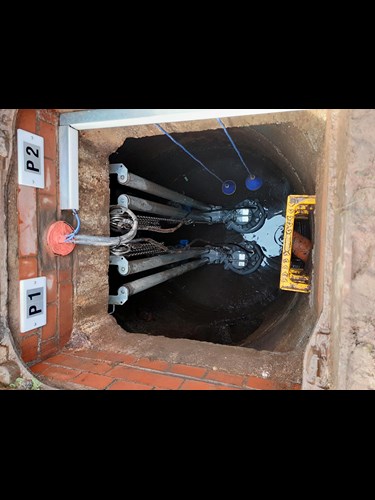Improvements made to Abergwili flood defence gates to alleviate secondary flooding

CYMRAEG ISOD
The first stage of work on a Natural Resources Wales flood defence asset has been completed.
Two sump pumps have been installed in the storm chamber. In January 2024 the flood gates will be modified with a gate hinge mechanism.
Once both stages are completed, they are expected to reduce flood water levels in that specific area of Abergwili, as well as reduce the drain on NRW resources during severe weather incidents.
During normal weather conditions water flows to the sump (behind the defence) and passes though the flood bank into the outgoing ditch. The chamber is protected via a flap valve which stops water re-entering the system.
During a flood event operational staff attend at the flood defence to close the flood gates. Flood waters rise on the river side and the main storm water has nowhere to go. The flap is held closed by the flood waters causing the level to rise in the storm chamber. This causes secondary flooding behind the bank and gates.
NRW staff pump water from behind the defence using diesel pumps. This is very labour intensive, involves significant travel time, uses fuel and creates additional carbon emissions.
NRW worked with Mechanical, Electrical, Instrumentation, Control and Automation (MEICA), Asset Performance and Operations Southwest, to come up with a more sustainable solution and an idea was developed to use submersible pumps within the existing sump to pump out the water.
Christopher Cook, Specialist Engineer, NRW, said:
“We have worked with different teams and organisations to find a more sustainable solution to the issues faced at Abergwili flood gates.
“The first stage is complete with the installation on the secondary pumps, and the work to the gates will be carried out in the New Year. This will hopefully alleviate pressure on NRW staff during adverse weather incidents, and importantly reduce the risk of secondary flooding in this area which has been prone to flooding for many years.
“This has been a complex project to develop and carry out the installation work in such restrictive conditions.”
Before the pumps could be installed some preparatory work needed to be carried out including installing a concrete plinth for the control kiosk, ducts for power cables in the chamber, cleaning out the sump chamber and installing new pipework.
The whole operation required working in a confined space and was completed by Pump Supplies of Port Talbot. The system is now ready to put to work on the next flood incident.
Local firms have supplied the goods and services to complete this work.

